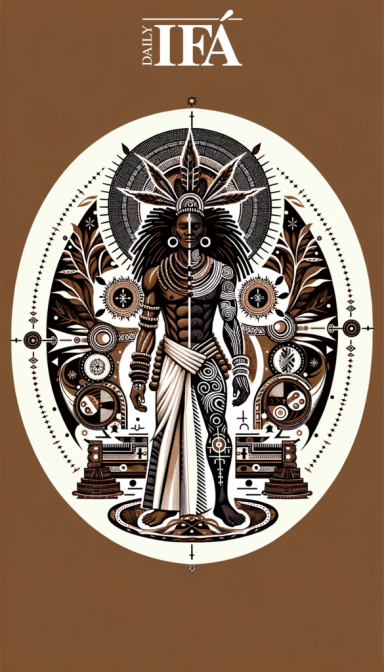
About ORISHÀ BABALU AYE
Orishá Babalu Aye, also known as Omolu, Obaluaye, and several other names, is a prominent deity in the Yoruba, Candomblé, and Santería religions. He is revered as the god of disease and health, embodying both the power to inflict illness and the ability to heal. Omolu's influence on a person's life is profound and multifaceted.
Omolu's/Babalu Aye's influence on a person's life encompasses physical health, spiritual cleansing, and deep psychological impacts. His followers often experience a life marked by a strong sense of endurance, a complex relationship with material wealth and social status, and a deep connection to both the joys and pains of life. This profound impact reflects the dual nature of Omolu as both the bringer of disease and the healer.
About the ORISHÁ
Roles and
Influence
- God of Disease and Health: Omolu is uniquely associated with both causing and curing diseases, particularly infectious diseases like smallpox and leprosy.
- Healer: Despite his association with disease, Omolu is a potent healer, able to cure severe ailments.
- Guardian Against Epidemics: He is invoked during times of widespread illness to protect against epidemics.
- Protector of the Marginalized: Omolu is known to protect the poor and marginalized, groups often disproportionately affected by the diseases he governs.
- Patron of Medical Professionals: He is seen as a patron deity for healers, doctors, and others in the medical field.
- Symbol of Suffering and Endurance: Omolu embodies human capacity for endurance amidst hardship and suffering.
- Spiritual Cleanser: His role in purging disease is viewed as a form of spiritual purification.
- Guardian of Life and Death: Omolu stands at the boundary between life and death, holding power over both.
- Symbol of Transformation and Renewal: He symbolizes the opportunity for a fresh start after illness.
- Deity of the Earth: Omolu is associated with the earth, from which many healing herbs and medicines are derived.
Characteristics and Symbolism
- Symbols: He is represented by a bundle of palm stems surrounded by cowrie shells, a spear, raffia strings with bells, and a necklace with buffalo horn rings.
- Colors: His associated colors are black, red, and white.
- Natural Places: Omolu is connected to cemeteries, caves, and beaches.
- Flowers and Plants: He is associated with chrysanthemums, pepper plants, miracle trees, and various other herbs.
- Metal and Stones: His elements include lead, black tourmaline, obsidian, onyx, and cat's eye.
- Health Domain: As the deity of health, he governs all parts of the body.
- Planetary Association: Saturn.
- Greeting: "Atótó!" which means peace.
- Offerings: Includes roosters, ducks, popcorn, black beans, and specific drinks and foods.
Key Manifestations (Aspects)
Omolu (Babalu Aye) manifests in over hundred forms, including
- Agbaba Jagun - Jagun warrior connected to Oyá.
- Ahosuji Jagun (or Segi) - Jagun warrior connected to Oshmarê, Yemanjá, and Nanã.
- Ajoji Jagun - Jagun warrior connected to Ogum and Oshaguiã.
- Arawê (or Arapaná) Jagun - Jagun warrior connected to Oyá and Oshalá.
- Itetu Jagun - Jagun warrior connected to Yemanjá and Oshalá.
- Itubé Jagun - Young Jagun warrior connected to the Funfun Pantheon. Connected Orishás: Oshaguiã, Xangô Ayrá, Oshalufã.
- Omolu Afomam - This Omolu is related to infections and epidemics. He is associated with climbing plants. Connected Orishás: Ogum, Eshu, and Oshumarê.
- Omolu Agorô - Dresses in white with fringes made of raffia straw.
- Omolu Ajunsu (or Posun, or Ponsuru) - Energetic and jovial Omolu, connected to the seasons and the wealth of the earth. Connected Orishás: Irokô, Oshalá, Oshumarê, Oshun, and Ogum.
- Omolu Akavan - Omolu connected to the spirits of the ancestors. Connected Orishás: Oyá Igbalé.
- Omolu Avimaje (or Aziujiun) - Omolu connected to Nanã, Ossaim, and Odé.
- Omolu Azoani - Young and violent Omolu warrior. He is the great witch hunter who "kills and eats" - Opanijé. Connected Orishás: Iroko, Oshumarê, Oyá, Yemanjá.
- Omolu Intoto - Highly unstable quality of Omolu that is not initiated (instead, Azoani is initiated). He is connected to the holes in the earth and the deserts. Connected Orishás: Ewá, Oyá, Iku.
- Omolu Ipopô - Omolu quality closely related to Nanã. Connected Orishás: Nanã.
- Omolu Sapekó (or Savalu) - Connected Orishás: Nanã.
- Tetu Jagun - Jagun warrior connected to Oyá and Ogum.
Sign-Up for free to your Weekly Newsletter.
Illustrations of the Orishá
Wir benötigen Ihre Zustimmung zum Laden der Übersetzungen
Wir nutzen einen Drittanbieter-Service, um den Inhalt der Website zu übersetzen, der möglicherweise Daten über Ihre Aktivitäten sammelt. Bitte prüfen Sie die Details und akzeptieren Sie den Dienst, um die Übersetzungen zu sehen.




